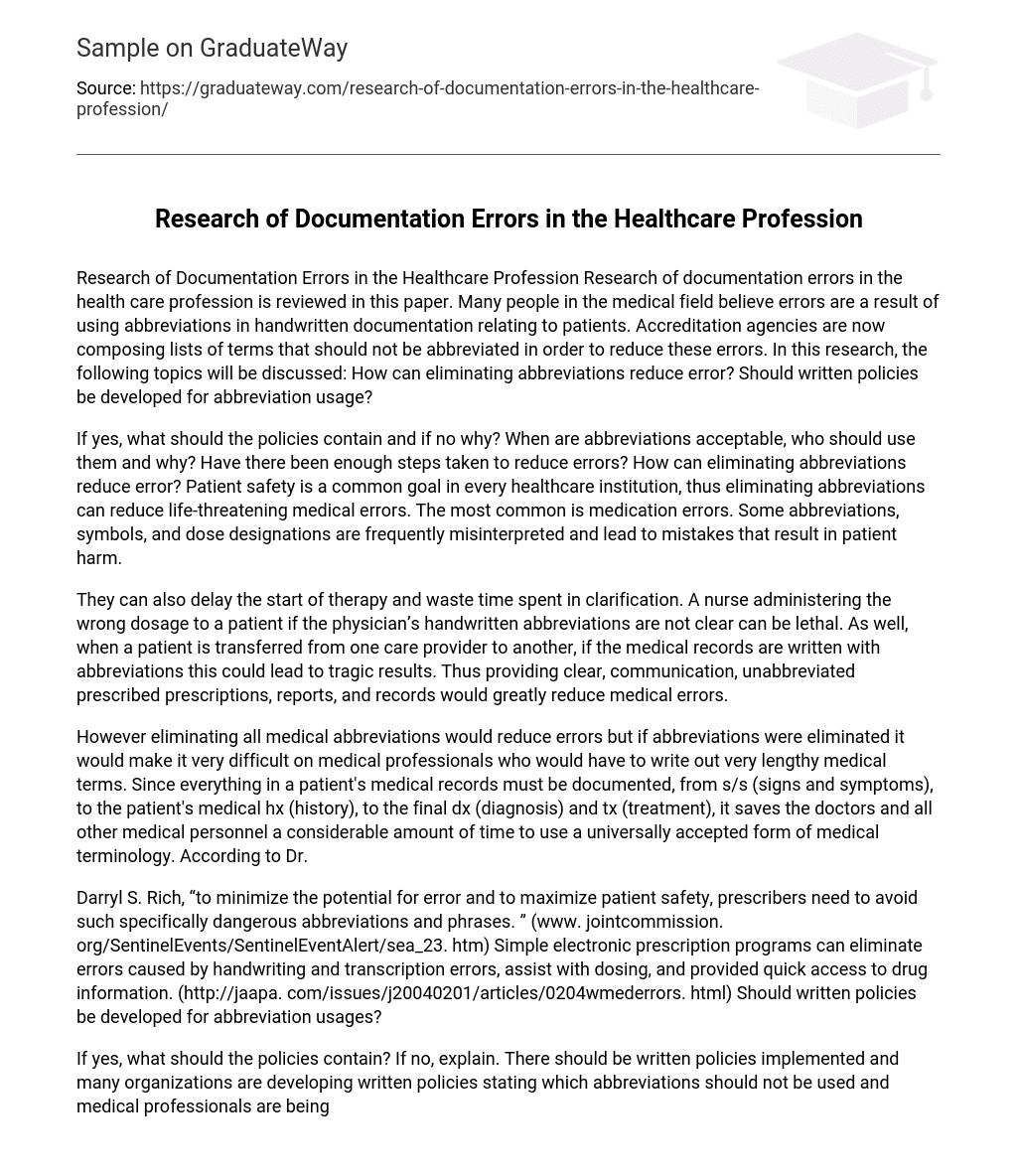Research of Documentation Errors in the Healthcare Profession Research of documentation errors in the health care profession is reviewed in this paper. Many people in the medical field believe errors are a result of using abbreviations in handwritten documentation relating to patients. Accreditation agencies are now composing lists of terms that should not be abbreviated in order to reduce these errors. In this research, the following topics will be discussed: How can eliminating abbreviations reduce error? Should written policies be developed for abbreviation usage?
If yes, what should the policies contain and if no why? When are abbreviations acceptable, who should use them and why? Have there been enough steps taken to reduce errors? How can eliminating abbreviations reduce error? Patient safety is a common goal in every healthcare institution, thus eliminating abbreviations can reduce life-threatening medical errors. The most common is medication errors. Some abbreviations, symbols, and dose designations are frequently misinterpreted and lead to mistakes that result in patient harm.
They can also delay the start of therapy and waste time spent in clarification. A nurse administering the wrong dosage to a patient if the physician’s handwritten abbreviations are not clear can be lethal. As well, when a patient is transferred from one care provider to another, if the medical records are written with abbreviations this could lead to tragic results. Thus providing clear, communication, unabbreviated prescribed prescriptions, reports, and records would greatly reduce medical errors.
However eliminating all medical abbreviations would reduce errors but if abbreviations were eliminated it would make it very difficult on medical professionals who would have to write out very lengthy medical terms. Since everything in a patient’s medical records must be documented, from s/s (signs and symptoms), to the patient’s medical hx (history), to the final dx (diagnosis) and tx (treatment), it saves the doctors and all other medical personnel a considerable amount of time to use a universally accepted form of medical terminology. According to Dr.
Darryl S. Rich, “to minimize the potential for error and to maximize patient safety, prescribers need to avoid such specifically dangerous abbreviations and phrases. ” (www. jointcommission. org/SentinelEvents/SentinelEventAlert/sea_23. htm) Simple electronic prescription programs can eliminate errors caused by handwriting and transcription errors, assist with dosing, and provided quick access to drug information. (http://jaapa. com/issues/j20040201/articles/0204wmederrors. html) Should written policies be developed for abbreviation usages?
If yes, what should the policies contain? If no, explain. There should be written policies implemented and many organizations are developing written policies stating which abbreviations should not be used and medical professionals are being trained to write legible when using other abbreviations. The written policies are necessary so ensure the safety of all patients. The JCAHO (Joint Commission on Accreditation of Healthcare Organizations) has recently mandated the accredited organizations to develop and enforce a list.
As well as the ISMP (Institute for Safe Medication Practices) are developing written policies stating which abbreviations should not be used. The Joint Commission has come up with a do not use list and the ISPM has a list of error-prone abbreviations, symbols and dose designations. (www. jointcommission. org/PatientSafety/DoNotUseList) (www. ismp. org) When are abbreviations acceptable? Who should use them and why? Acceptable abbreviations have been studied and adopted by most medical organizations. JCAHO provides institutions with a list of dangerous abbreviations that should be avoided in clinical documentation.
In addition, ISMP promotes the consistent application of not using specified abbreviations to prevent errors. The policy recommends not using abbreviations, symbols, and acronyms in medical communication. According to ISMP, abbreviations should never be used in “internal external communication, telephone/verbal prescriptions, computer generated labels, labels for drug storage bins, medication administration records, as well as pharmacy and prescriber computer order entry screens. ” With the use of these policies and recommendations from these organizations, the abbreviation errors would reduce.
It would also be standardized so all persons in the medical field would understand the abbreviation method. Medical professionals should use abbreviations and acronyms only when they you need them. You should introduce an abbreviation or acronym by putting it in parentheses immediately after the word, it stands for, and you should always confirm that others correctly understand your abbreviation or acronym. (www. boston. com/jobs/healthcare/oncall/articles/2008/04/10/in_other_words) According to the information in the online articles, do you think enough steps have been taken to reduce errors?
Explain why you agree or disagree. In my opinion, I think that with the help of JCAHO and ISMP steps have been taken to reduce errors. Although there is always room for improvement as doctors are constantly coming up with new terms and acronyms. It is important that proper education be given to the healthcare members and frequent evaluation be done. Also, the healthcare management must be responsible to adhere to the policy. It is also recommended that an updated additional written policy be carried out. http://www. jointcommission. rg/PatientSafety/NationalPatientSafetyGoals/ http://www. ismp. org/Newsletters/acutecare/recentarticles. asp Reference Page (www. jointcommission. org/SentinelEvents/SentinelEventAlert/sea_23. htm) (http://jaapa. com/issues/j20040201/articles/0204wmederrors. html) (www. jointcommission. org/PatientSafety/DoNotUseList) (www. ismp. org) (www. boston. com/jobs/healthcare/oncall/articles/2008/04/10/in_other_words) http://www. jointcommission. org/PatientSafety/NationalPatientSafetyGoals/ http://www. ismp. org/Newsletters/acutecare/recentarticles. asp





